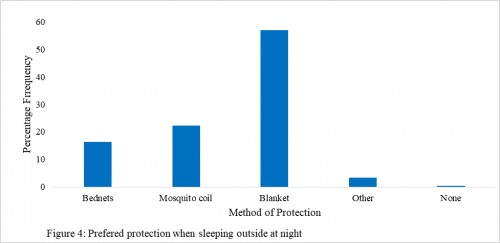Human nighttime outdoor activities in a rural community of north-central Nigeria: Implications for residual malaria transmission
Author(s): Pam DD, Neslea AM, Lapang M, Njila HL, Ombugadu A and Akindigh TM
Abstract: Introduction: Residual transmission can limit control efforts to tackle the scourge of malaria in rural settings where nighttime activities are mostly outdoor. This cross-sectional study determined the risk of night-time activities for malaria transmission in a Nigerian community
Methods: We administered a structured questionnaire to collect data from three communities in Dokan Tofa district while outdoor catches of mosquitoes were carried out to determine the presence of malaria vectors and ascertain sporozoite rates.
Results: January-March was the most likely period of the year for inhabitants to sleep outside. Tengzet community was the most likely to have inhabitants sleeping outside during the first quarter of the year. A sporozoite rate of 10.3% was observed with Anopheles gambiae s.l as the most abundant anopheline species encountered.
Conclusion: As climate change worsens, its’ toll on human activities at night will prevent the interruption of transmission and endanger the outcomes of control interventions.
 Fig.:
Fig.: Prefered protection when sleeping outside at night
How to cite this article:
Pam DD, Neslea AM, Lapang M, Njila HL, Ombugadu A, Akindigh TM. Human nighttime outdoor activities in a rural community of north-central Nigeria: Implications for residual malaria transmission. Int J Mosq Res 2019;6(4):26-30.



